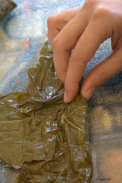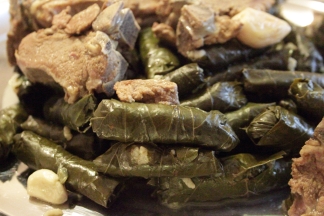post 283/365

Food in any culture, and especially in the Middle Eastern culture, has its own unifying language. It brings people and families together over a hot feast expressing affection and a certain transcendent expertise in cookery.
Around every big celebration in Lebanon, a mammoth dish of rolled vines leaves and lamb culets is usually served, the very famous mehshe warak enab. As the aromas and the piping hot steam of the dish fills the room and family and friends are pushed around for this labor intensive dish to make its big entrance, the feeling and the smell of being Home permeates one’s spirit with warmth, intoxicating the soul with a certain feeling of contentment and belonging.
The origin of this dish is puzzling and like most dishes of this area (hommos, falafel, etc…) it is of conflicting origins. “Ask any Greek for the origin of dolmades and you will in all likelihood be told that they were served atop Mount Olympus. To the Greeks all the foods that are special, traditional and delicious like dolmades – grape leaves stuffed with minced lamb and rice – were first served on the mountain of the gods – along with ambrosia and nectar. Mention that stuffed vine leaves are fairly common throughout the Middle East and in Turkey, and a Greek, while acknowledging the fact, will suggest that it was because the Greeks brought them to the region. As a matter of fact, some Greeks will tell you that the origin of stuffed vine leaves goes back to the time when Alexander the Great besieged Thebes. Food became so scarce that the Thebans cut what meat they had into little bits and rolled it in grape leaves.” (article from the New York Times, referenced below)
Turks on the other hand believe that this dish is of definite Turkish origin. Dolma, an Ottoman Turkish verbal noun of the Turkish verb dolmak, means “stuffed thing.” Dishes involving wrapping leaves such as vine leaves or cabbage leaves around a filling are called sarma, though in many languages the distinction is usually not made. Sarma comes from the verb sarmak in the Turkish language meaning ‘to wrap’ or ‘to roll.’
In the Arab and Middle Eastern world Sarma is known as waraq ‘inab though the preparation remains the same as in Greek and Turkish cuisines. Grape leaves are harvested and wrapped around minced lamb along with onions and rice, cooked in olive oil or in gee, like in some villages used to enhance the flavor.
The Middle Eastern cuisine has a habit of stuffing things too. Green peppers, onions, tomatoes, Swiss chard, courgette, eggplants, and cabbage are all commonly stuffed, usually with a mix of rice, minced meat, and various spices. In terms of grape leaves, every Mediterranean or Middle Eastern country has a distinguishing mixture. The Greek and Lebanese like lamb in their cuisine, and so they use minced lamb in their dolmades.
The tender shoots of vine leaves are usually collected in late spring. The smaller leaves goring towards the tip of the branch are usually picked. They are either cooked straight away or preserved for the store cupboard. Mehshe warak enab is time consuming. It takes practice and patience.
Vine leaves are typically served formed like a cake which means that you need a pair of strong and dexterous arms to hold the dish on top of the pot and turn it upside down; you would need to keep the pot in place for a few minutes before removing it to make sure that the vine leaves stay together.
This slow cooked dish is the epitome of soul food. It’s prepared patiently and dexterously by a person who most probably has been cooking it for years and whose recipe has been passed down from another matriarch in the family. It is cooked on low fire for hours and then served as the piéce de resistance on the table. Warm, aromatic, and full of flavor it is enjoyed and shared with everyone, discussed and then given its own standing.
As far as I am concerned there is nothing that is more Lebanese cuisine and home then Warak enab. No Christmas dinner or lunch would be complete without one… Merry Christmas to all!
http://www.nytimes.com/1983/12/25/travel/stuffed-grape-leaves-greek-style.html











Please e-mail me as I have something to ask. Thank you.
LikeLike
Hi. I am still a novice at blogging so can’t seem to find your email.
LikeLike
sidneybek@yahoo.com
LikeLike
Soul food – that’s a very good expression for Lebanese food! I wrote about living a food festival, it’s amazing. 🙂
LikeLike